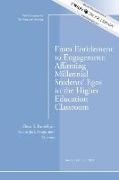Share
Fr. 38.50
Dave S. Knowlton, Dave S. Hagopian Knowlton, Kevin Jack Hagopian, Dave S. Knowlton
From Entitlement to Engagement: Affirming Millennial Students Egos - New Directions for Teaching and Learning, Number 135
English · Paperback / Softback
Shipping usually within 1 to 3 weeks (not available at short notice)
Description
List of contents
EDITORS' NOTES 1 Dave S. Knowlton, Kevin Jack Hagopian 1. Rethinking the Structural Architecture of the College Classroom 7 Kevin Jack Hagopian For the college classroom to be effective in affi rming Millennial students' egos, professors must reconsider its psychological and structural architecture. By adhering to a checklist of practical advice, professors can promote engagement over entitlement. 2. Navigating the Paradox of Student Ego 19 Dave S. Knowlton Student ego is multidimensional and paradoxical. Professors must understand the sense of entitlement that is born of ego, but professors also must appreciate opportunities for meaningful engagement that are made possible by the ego. Professors can help students leverage the positive benefits of ego engagement. 3. What Students Say about Their Own Sense of Entitlement 31 Darren S. Fullerton Students have a customer service mentality, believing that they deserve to be treated as consumers. The results of a focus group indicate that Millennial students have specifi c beliefs about classroom norms, their own role as college students, and professors' expectations. 4. The Syllabus: A Place to Engage Students' Egos 37 Mark Canada The course syllabus need not be a utilitarian bore for students. Professors can craft a syllabus that has a tone, style, and conceptual unity that promote intrigue and interest. Furthermore, professors can do much early in the semester to create student engagement with the syllabus. 5. Facilitating Class Sessions for Ego-Piercing Engagement 43 Stephen Lippmann Strategies used during class can affirm students' egos. By requiring participation, learning students' names, and injecting class activities with ideas that elicit reactions from students, professors can help the college classroom appeal more strongly to Millennial students. 6. Immersion in Political Action: Creating Disciplinary Thinking and Student Commitment 49 Karen Kelly Assignments that immerse students in discipline-specifi c activities can impact Millennial students' thinking. This chapter provides a case of engaging nursing students in health policy and politics. The chapter also offers implications of the case. Those implications can help all professors effectively implement discipline-specific immersive assignments. 7. Selves, Lives, and Videotape: Leveraging Self-Revelation through Narrative Pedagogy 55 Alison G. Reeves Narrative pedagogy can provide opportunities for Millennial students to meaningfully engage with course content. A digital storytelling case provides an evocative example of narrative pedagogy engagement. Across higher education, professors can follow guidelines in this chapter to meaningfully implement narrative pedagogy. 8. Activating Ego Engagement through Social Media Integration in the Large Lecture Hall 61 C. Michael Elavsky Because social media are ubiquitous in the lives of many Millennial students, professors must rethink the ways that those media are utilized to promote engagement both within and outside of the classroom. Possible drawbacks of integrating social media should be considered and put in their proper perspective relative to the benefits of integrating social media into the classroom. 9. Affirming Ego through Out-of-Class Interactions: A Practitioner's View 69 Heather M. Knowlton Professors can engage Millennial students at an ego level by interacting with them outside of class. Through various out-of-class strategies for promoting more meaningful communication, professors can enhance students' opportunities for understanding course content, themselves, and their own rights and obligations. 10. Engaging Millennial Students in Social Justice from Initial Class Meetings to Service Learning 75 Jonathan J. Cavallero Millennial students must learn to recognize inequalities and develop skills that will help them work toward eliminating disparities and promoting equitability. Professors can enhance a social justice agenda within their courses through their teaching approach and assignments. Service-learning projects, in particular, can build cultural awareness and foster attitudes of helpfulness to those who are in need. 11. From Consumers to Citizens: Student-Directed Goal Setting and Assessment 81 David R. Coon, Ingrid Walker Assessment and evaluations can motivate self-directed learning among Millennial students. For this motivation to occur, professors must view students as citizens of the classroom. As citizens, students can establish their own learning goals, recognize opportunities for higher levels of achievement, accept feedback from external stakeholders, and participate in course critiques. These activities add meaning to assessment. 12. The Bruised Ego Syndrome: Its Etiology and Cure 89 Bruce W. Speck When professors depend on their formal authority, as opposed to their pedagogical authority, they likely will fall victim to the bruised ego syndrome. When professors align themselves with current realities and respond to the call for a new form of classroom management, they will align themselves better with the needs of Millennial students. INDEX 97
Summary
This volume addresses theories and practices surrounding the entitled, self-absorbed students called Millennials.
Product details
| Authors | Dave S. Knowlton, Dave S. Hagopian Knowlton |
| Assisted by | Kevin Jack Hagopian (Editor), Dave S. Knowlton (Editor) |
| Publisher | Wiley, John and Sons Ltd |
| Languages | English |
| Product format | Paperback / Softback |
| Released | 07.10.2013 |
| EAN | 9781118770108 |
| ISBN | 978-1-118-77010-8 |
| No. of pages | 112 |
| Series |
New Directions for Teaching & J-B TL Single Issue Teaching and Learning New Directions for Teaching & |
| Subject |
Humanities, art, music
> Education
> Adult education
|
Customer reviews
No reviews have been written for this item yet. Write the first review and be helpful to other users when they decide on a purchase.
Write a review
Thumbs up or thumbs down? Write your own review.

